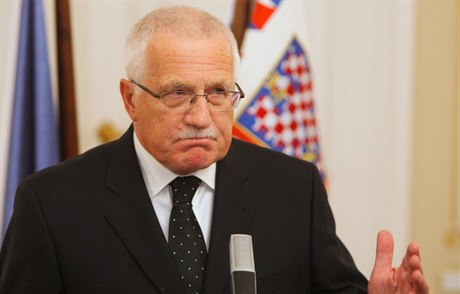Czech President Václav Klaus used the annual gathering of Czech diplomats at Prague Castle on August 30 to express several controversial opinions: he called for further reducing the number of Czech embassies, negotiating a permanent opt-out from the commitment to eventually adopt the euro, and also sharply criticized the government’s new foreign policy concept adopted in July, which he said “is not about the real problems of foreign policy.”
What exactly is not to President Klaus’ liking about the government’s new foreign policy concept? Basically everything, because in The president’s deliberations revealed a lack of conceptuality on his part and there were three such moments in his speech to the diplomats. his view it is not based on “knowledge and clarification of our authentic interests.” Instead, Klaus claims, the strategy contains only generalizations and “basically vacuous themes (or quasi-themes).” Klaus said he considers the document to be “neutral” in so far as it doesn’t deal with “unpleasant and alarming developments and tendencies … and doesn’t address specific issues.” Of the seven issues he mentioned as examples of what’s missing, five relate to the European Union and the other two – protecting the Beneš Decrees under which the Sudeten Germans were expelled from Czechoslovakia after World War II, and visa requirements for Czechs travelling to Canada.
It would be a challenge to be more critical of the foreign policy concept in five paragraphs, the amount which Klaus dedicated specifically to the government document.
This isn’t the place for polemics about this or that theme or an argument about whether any “authentic” interests actually exist. But concerning the themes mentioned by Klaus, it’s noteworthy to what extent he expects the developments in the European Union to dictate Czech foreign policy. And on the issue of interests, Klaus’ emphasis upon authenticity is a pretty blatant maneuver aimed at discrediting the positions of those who have a different view to his own about the interests of the Czech Republic.
Klaus lacks conceptuality
What deserves more attention are the president’s deliberations which revealed a lack of conceptuality on his part and there were three such moments in his speech to the diplomats.
The first was the discrepancy between his criticism of the new concept for its generality, and his call for a written concept which would serve as “a foundation of the basic contours and priorities of our foreign policy.” After all, if the essential idea of the concept is the formulation of the foundation of the basic contours and priorities of foreign policy, it’s not possible to avoid generalizations. One can easily imagine that if it had suited him, the president would have readily criticized the foreign policy concept for its superfluous detail.
The new concept does of course mark out the basic priorities and contours of foreign policy. And given that the Czech Republic lies in the middle of the European continent, it’s completely understandable that those priorities are geared towards Europe. It would be stupid to underestimate the value of transatlantic ties (which the concept doesn’t do), nevertheless the majority of this country’s political, economic and also security interests lie within Europe. These interests cannot be limited to the European Union and, to its credit, the foreign policy concept doesn’t do this.
The second sign of the president’s lack of conceptuality was his reproach that the document does not make any mention of the “currentGiven the Czech Republic lies in the middle of the European continent, it’s completely understandable that thse priorities are geared towards Europe. crisis of European integration.” Indeed Klaus doesn’t express himself in neutral terms and use of the term “crisis” is obviously a subjective judgment. Almost all of the reproaches he made towards the document stem from this view. Whether or not his judgment has validity or not can be argued, but that’s not the problem. What is problematic is the presumption that if there is a crisis, the concept of foreign policy should be formulated around such a crisis. Such a far-sighted policy could be likened to generals preparing for a past war.
The point of the concept is to attempt to define the basic priorities and contours which President Klaus was calling for. And such an initiative cannot be based upon a current crisis, but should be formulated through consideration of the wider and long-term consequences. The concept is an attempt to do this and there should be discussion as to what extent it is a success in this respect. The concept is not a holy cow but is first and foremost a political document (therefore it is adopted by the government) and can be changed through political decision.
The comments about the crisis in European integration lead to the third sign of the president’s lack of conceptual thinking. The paradox here is that if there really is a serious crisis with European integration, it does not make much sense to call for the closure of diplomatic representations in European countries. More fundamentally, the foreign policy concept also serves as a message to foreign actors in international politics. It’s hard to imagine a situation that would lead to a better standing of the Czech Republic within the EU if the concept for foreign policy contained specific consideration of the potential consequences and outcomes of the supposed crisis in European integration.
Intellectual laziness
In the Czech lands it is often said that there is no comprehensive concept of foreign policy and one can also hear the opinion that that there is little or It cannot be said that there are no concepts or that they are not discussed. Such claims are often the result of automatic rejection and expose a lack of conceptual thinking. practically no discussion on formulating such a concept. It is first and foremost those whose proposals for the concept were not included, or opposition figures, who like to use these arguments. Claims that there is an absence of conceptual contemplation and debate are first and foremost a consequence of intellectual smugness, if not laziness.
At the beginning of this year the Association for International Affairs (AMO) and the Institute for European Integration presented their proposal for a Czech Foreign Policy Concept. Last year the Prague-based Institute for International Relations published a work in three volumes called ‘The Search for Czech Interests,’ in which the authors discuss in great detail the interests of the Czech Republic in the areas of international security, business and trade, human rights and international developments, and also wider issues connected with formulating Czech foreign policy.
This November the Institute of International Relations will host its third symposium dedicated to Czech foreign policy. At the previous symposium in May, 2010, one of the most interesting contributions was by Jiří Schneider, who is now the first deputy Minister of Foreign Affairs. Much of what he said then has appeared in the government’s new foreign policy concept.
Therefore, it cannot be said that there are no concepts or that they are not discussed. Such claims are often the result of automatic rejection and expose a lack of conceptual thinking. And such is the case with Klaus’ disparagement of the new Foreign Policy Concept.





